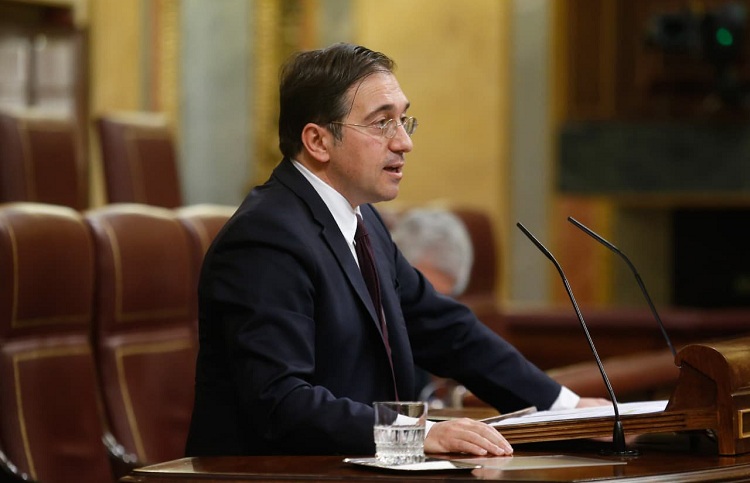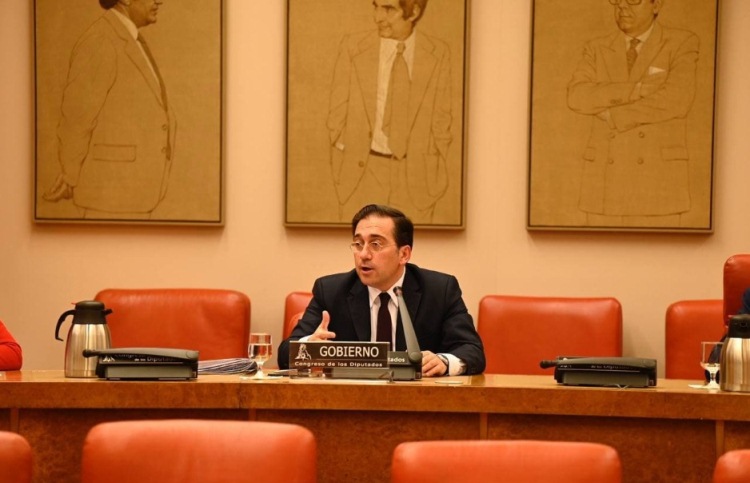The Diplomat
The controversy generated by the recent Spanish-Turkish Summit reached the Congress yesterday, where the Minister of Foreign Affairs, José Manuel Albares, assured that the current relations between Madrid and Ankara are the same that “all Spanish governments” have maintained since the nineties.
“Since the mid-nineties there has been a very intense relationship of all governments with Turkey that has only increased,” said the minister before the plenary of the Lower House in response to an intervention of the deputy Marta Rosique, of ERC, in which she denounced the “rapprochement” between the President of the Government, Pedro Sánchez, and the “authoritarian” President of Turkey, Recep Tayyip Erdogan, a relationship that represents a “clear support” to the regime in Ankara and in which “Human Rights have been left out”.
According to the minister, in the current relationship between Spain and Turkey “there is no intensification or rapprochement, there is continuity” with respect to the policy of previous governments. In this sense, Albares recalled that the summit was the seventh high-level meeting between the two countries and that the two countries share their belonging to the Mediterranean world and coincide in many forums and international organizations, such as NATO. He also pointed out that the interest of Spanish businessmen in Turkey also comes from behind, as evidenced by the presence of more than 600 companies in the country.
The Minister also assured that the situation of Spain as a “bridge between the EU and Turkey” does not prevent addressing the “discrepancies” between the two governments, so that our country can become “the voice that attracts Turkey to Human Rights at all times”.
Spanish-Turkish Summit
Spain and Turkey held last November 17 in Ankara the VII Spanish-Turkish Summit, the first since the arrival of Pedro Sánchez to the Government (the two previous ones, in Madrid in 2018 and in Ankara in 2014, were held under the presidency of Mariano Rajoy, of the PP). During the press conference following the summit, Erdogan assured that Turkey wants to acquire a second aircraft carrier and a series of submarines for its Navy in collaboration with Navantia, which is already helping the Turks in the construction of a smaller aircraft carrier.
These statements caused a great stir in Greece and Cyprus, two countries that have a tense neighborly relationship with Turkey, recently aggravated by gas exploration in the Eastern Mediterranean, and which do not accept that Spain, a partner country in the European Union, has such close ties in military matters with a government like the one in Ankara.
Greece even misses the fact that Spain does not show it as firm a support as other European countries, mainly France, have shown. During Albares’ recent official visit to Athens in mid-December, his Greek counterpart, Nikos Dendias, conveyed to him Greece’s “concern” about “Spain’s possible intention to strengthen its military cooperation with Turkey”. For his part, Albares limited himself to assuring that “Spain is very clear in its support for constructive dialogue between Greece and Turkey and the search for solutions in accordance with international law”.
The other major sticking point is the “Cyprus question”. The country has been divided since 1974 between a self-proclaimed Turkish Republic of Northern Cyprus, recognized only by Ankara, and the Republic of Cyprus, a majority Greek-Cypriot entity with its capital in Nicosia, which does have international recognition and is even a member state of the EU.
During his recent official visit to Madrid, the President of Cyprus, Nikos Anastasiadis, and Pedro Sánchez agreed on a joint communiqué in which they supported “the sovereignty and territorial integrity of the countries” and called for “a comprehensive and viable solution to the Cyprus issue, based on a bicommunal and bizonal federation with political equality”. Likewise, Albares and his Cypriot counterpart, Nikos Christodoulides, agreed in Nicosia (where the minister arrived from Athens) on the need to improve bilateral cooperation and coordination on “issues of mutual interest on the European agenda”, such as “EU relations with third countries, including Turkey”.
Taking into account the importance of Spain’s economic interests in Turkey, the attitude shown by the PP since the summit took place has not been viewed favorably within the Executive. Recently, the president of the PP, Pablo Casado, traveled to Greece and Cyprus to show his party’s commitment to the territorial integrity of both countries. This trip has been interpreted by Moncloa as an attempt to question the position of the Government, which has also defended the integrity of the two countries.







